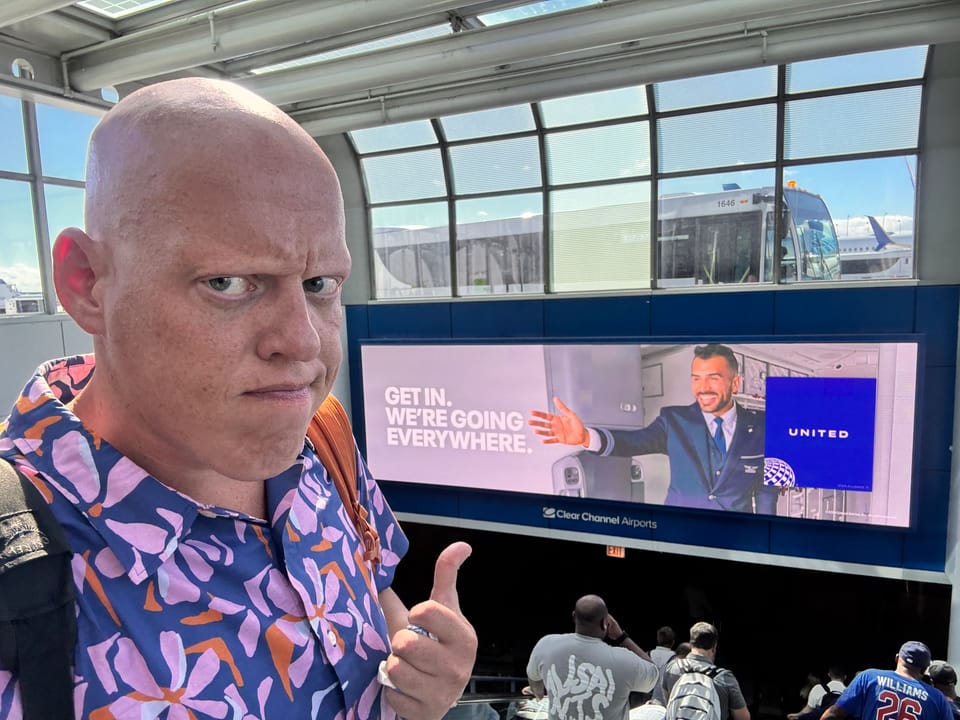Weekend Edition / Dear Ohad...
Flights vs. hotel upgrades? Both matter—flights save cash, hotels save sanity. Business class ruins coach for life. Points bribe families and sometimes blow up your wallet. Delegate wisely or watch your points run wild. Manage smart, or get schooled by the loyalty game. 💥 Boom, travel truth served.

My boss wants to use points for flights. I want hotel upgrades. Who’s right?
—Divided in the Boardroom
Dear Boardroom,
Neither side is wrong, but you both need to step back and look at the bigger picture. Flights and hotels are different beasts in corporate travel budgets, and your points strategy should reflect that.
Flights typically eat up 40–60% of a business travel budget for SMBs. Using points for flights can save tens of thousands annually — especially on long-haul or premium cabins where cash fares are brutal. For example, redeeming 70,000 points for a business class flight worth $3,000 is a 4.3 cents per point value — way above average.
But don’t neglect hotels. Hotel upgrades, especially to suites or executive lounges, often have outsized effects on employee satisfaction and productivity. Imagine your top performer arriving exhausted after a cross-country trip — then checking into a basic room with no lounge access. Points used for hotel upgrades can translate to happier, more focused employees, lowering turnover.
ProTip: Centralize all corporate points in one account or platform. Set a budget split — for example, 60% of points toward flights, 40% toward hotels — that fits your company’s culture. Track redemption impact regularly. Balance cash savings with employee experience.
I got upgraded to business class… and now coach feels like punishment. Help?
—Forever Ruined
Dear Ruined,
Congratulations. You’ve reached a new level of travel sophistication — and a classic trap.
Business class upgrades are often “the best first class you’ll never have.” But after that lie-flat seat and pre-flight Dom, sitting back down in economy can feel like a fall from grace. The good news? You can manage the mental shift.
First, understand that the average economy seat on domestic US flights measures about 17 inches wide with 30–32 inches of pitch, compared to 21–22 inches wide and 60+ inches pitch in business class. That’s a physical and psychological gap. But here’s the kicker: business class seats can be three to four times the cash price of economy.
Example: A cross-country flight might cost $300 in coach but $1,200 in business. Use your points for those premium experiences sparingly and strategically — for trips that matter most: client meetings, conferences, or long-haul international flights. Treat coach as your baseline; it’s the budget discipline that funds your luxury.
ProTip: Set a redemptions “priority matrix.” Use business class points for flights longer than 4 hours or key trips. For flights under 2 hours, save points and fly economy. This keeps your travel program sustainable and your sanity intact.
Can I use points to bribe my family into a reunion?
—Family Negotiator
Dear Negotiator,
Absolutely, and you’re onto a powerful truth: points are emotional currency disguised as travel perks.
Consider this: The average domestic family trip costs $1,500 per person. Redeeming points for flights and hotels can slash that by 60% or more. But more importantly, these trips create memories and bonds that no spreadsheet can quantify.
Example: Use 100,000 points to fly four family members on a road trip to a national park, and book a couple of nights at a hotel with points or certificates. Suddenly, you’re not just saving cash—you’re investing in your family culture.
That said, treat points as strategic investments in relationships, not just rewards. A well-timed family reunion paid for with points can act as a peace offering after a tough year or a way to reset dynamics.
ProTip: Create a “points for memories” fund within your loyalty programs. Encourage family members to pitch in points, or allocate a corporate points pool to fund family events that strengthen your team’s culture.
I just blew 200K points on something dumb. Please judge me gently.
—Redemption Regret
Dear Regret,
No judgment. Every points hacker has a “redemption disaster” story.
The first thing to know: points aren’t cash. They’re a leverage tool, and misuse can cost you real opportunity. For example, spending 200,000 points on a $1,000 value hotel stay yields only half a cent per point — far below the average 1.5 to 2 cents per point smart redemptions aim for.
Example: Instead, you could have booked two business class flights worth $4,000 total for those same points — a 2 cents per point value.
The key is to view points like an investment portfolio: every redemption should maximize return or meet a strategic goal. That means planning ahead, running rough ROI calculations, and sometimes asking an expert.
ProTip: Before every big redemption, run a quick “value per point” check:
Redemption value = cash price of the ticket or hotel
Divided by points spent = cents per point (cpp)
Aim for 1.5 cpp or higher for good value.
Should I book my own travel or let my assistant handle it?
—Overwhelmed Executive
Dear Executive,
Delegation is essential if you want to scale your business travel program. But only if your assistant understands the rules of the loyalty game.
Train your assistant on your key programs:
- How to check award availability
- Which credit cards earn which points
- Your personal travel preferences (airlines, hotels, seat choices)
Example: One consulting firm I worked with trained their assistant to handle 80% of bookings, cutting executive time spent on travel by 70%, while increasing points earned by 40%.
Set clear policies: e.g., assistants must confirm redemptions meet minimum value thresholds or must get approval for premium cabin upgrades.
ProTip: Use centralized travel management tools or apps that your assistant can access — this increases transparency and reduces errors.
Is it better to use free night certificates or just book with points?
—Cert Confused
Dear Confused,
Free night certificates are often overlooked gems. They’re like a high-value coupon that can save you hundreds on premium stays without burning through your points.
But certificates come with restrictions—eligible properties, blackout dates, and expiration. Points offer more flexibility, allowing you to book a wider range of hotels and dates.
Example: If your free night cert covers a $300-a-night hotel, that’s a direct $300 savings. Using points to book the same stay might cost 40,000 points. If you can earn those points back cheaply, points might be better for less expensive nights.
Best practice: Use certificates for peak or expensive nights to maximize value, and use points to fill in off-peak or budget stays.
ProTip: Track certificate expiration dates carefully. Use alerts 3 months ahead to plan your stays and avoid losing value.
How do I stop employees from draining points on personal trips?
—Points Police
Dear Police,
This is a common SMB challenge. Points earned on corporate cards can easily get mixed up with personal spending, causing headaches and lost value.
Start by centralizing all business travel bookings through one platform or card. Use tools that flag non-compliant redemptions. Set clear written policies: points earned on business travel belong to the company and must be used for business purposes only.
Example: One company I helped implemented a policy requiring employees to submit trip reports and receipts for any award redemptions. Non-compliance led to temporary card suspensions.
Remember, if you don’t control the points, the points will control your budget.
ProTip: Use a travel management company (Hint: UpNonStop) or software that integrates loyalty programs with expense reporting. This gives you data to audit and control redemptions.
Until next time, May your points be plentiful, your redemptions strategic, and your upgrades perfectly timed.
Got a travel disaster, loyalty loophole, or redemption win?
Email newsletter@upnonstop.com and let the chaos begin.




